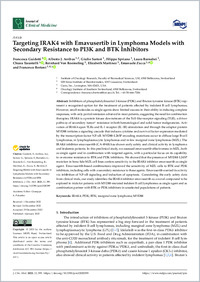Targeting IRAK4 with emavusertib in lymphoma models with secondary resistance to PI3K and BTK inhibitors
- Guidetti, Francesca ORCID Institute of Oncology Research (IOR), Faculty of Biomedical Sciences, Università della Svizzera italiana, Switzerland
- Arribas, Alberto J Institute of Oncology Research (IOR), Faculty of Biomedical Sciences, Università della Svizzera italiana, Switzerland ; SIB Swiss Institute of Bioinformatics, Lausanne, Switzerland
- Sartori, Giulio Institute of Oncology Research (IOR), Faculty of Biomedical Sciences, Università della Svizzera italiana, Switzerland
- Spriano, Filippo ORCID Institute of Oncology Research (IOR), Faculty of Biomedical Sciences, Università della Svizzera italiana, Switzerland
- Barnabei , Laura Institute of Oncology Research (IOR), Faculty of Biomedical Sciences, Università della Svizzera italiana, Switzerland
- Tarantelli, Chiara ORCID Institute of Oncology Research (IOR), Faculty of Biomedical Sciences, Università della Svizzera italiana, Switzerland
- Von Roemeling , Reinhard Curis, Inc., Lexington, MA , USA
- Martinez, Elizabeth Curis, Inc., Lexington, MA , USA
- Zucca, Emanuele ORCID Institute of Oncology Research (IOR), Faculty of Biomedical Sciences, Università della Svizzera italiana, Switzerland ; Oncology Institute of Southern Switzerland (IOSI), Bellinzona, Switzerland
- Bertoni, Francesco ORCID Institute of Oncology Research (IOR), Faculty of Biomedical Sciences, Università della Svizzera italiana, Switzerland ; Oncology Institute of Southern Switzerland (IOSI), Bellinzona, Switzerland
- 2023
Published in:
- Journal of Clinical Medicine. - 2023, vol. 12, no. 2, p. 399
English
Inhibitors of phosphatidylinositol 3-kinase (PI3K) and Bruton tyrosine kinase (BTK) represent a recognized option for the treatment of patients affected by indolent B cell lymphomas. However, small molecules as single agents show limited success in their ability in inducing complete responses, with only partial remission achieved in most patients, suggesting the need for combination therapies. IRAK4 is a protein kinase downstream of the Toll-like receptor signaling (TLR), a driver pathway of secondary tumor° resistance in both hematological and solid tumor malignancies. Activation of IRAK4 upon TLRs and IL-1 receptor (IL-1R) stimulation and through the adaptor protein MYD88 initiates a signaling cascade that induces cytokine and survival factor expression mediated by the transcription factor NF-κB. MYD88-L265P encoding mutations occur in diffuse large B-cell lymphomas, in lymphoplasmacytic lymphomas and in few marginal zone lymphomas (MZL). The IRAK4 inhibitor emavusertib (CA-4948) has shown early safety and clinical activity in lymphoma and leukemia patients. In this preclinical study, we assessed emavusertib effectiveness in MZL, both as single agent and in combination with targeted agents, with a particular focus on its capability to overcome resistance to BTK and PI3K inhibitors. We showed that the presence of MYD88 L265P mutation in bona fide MZL cell lines confers sensitivity to the IRAK4 inhibitor emavusertib as single agent. Emavusertib-based combinations improved the sensitivity of MZL cells to BTK and PI3K inhibitors, including cells with a secondary resistance to these agents. Emavusertib exerted its activity via inhibition of NF-κB signaling and induction of apoptosis. Considering the early safety data from clinical trials, our study identifies the IRAK4 inhibitor emavusertib as a novel compound to be explored in trials for patients with MYD88-mutated indolent B cell lymphomas as single agent and as combination partner with BTK or PI3K inhibitors in unselected populations of patients.
- Collections
- Language
-
- English
- Classification
- Medicine
- License
- Open access status
- gold
- Identifiers
-
- DOI 10.3390/jcm12020399
- ARK ark:/12658/srd1324943
- Persistent URL
- https://n2t.net/ark:/12658/srd1324943
Statistics
Document views: 131
File downloads:
- Bertoni_2022_MDPI_jcm: 260
